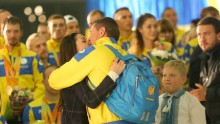Several hundred people came to meet and greet our athletes at Boryspil Airport, even though it was quite rainy. Most were holding flowers, bright balloons, and placards. The mood was festive. And although the flight was delayed, Terminal F where the athletes were supposed to arrive rang with folk songs and the national anthem of Ukraine. Meanwhile the supporters, from the athletes’ family and friends to sport officials from all the regions to mere Olympic and Paralympic fans, were getting acquainted, chatting, smiling, and taking pictures.
“They’ve landed!” The words echoed through the entire terminal. Everyone rushed upstairs to greet the champions. The building vibrated when the crowd burst out cheering: “Heroes! Heroes! Heroes!” The cries almost drowned the voice of Ilona Dovhan, anchorwoman with UA: Pershy TV station, who moderated the meeting.
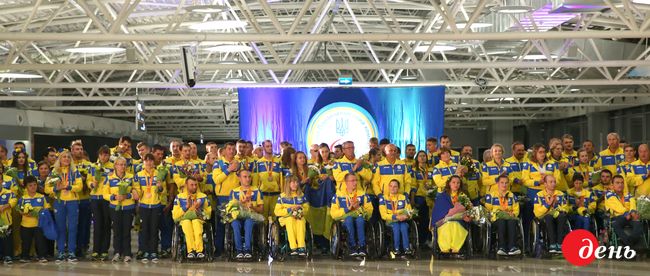
One by one, athletes appeared on an improvised podium. Most were wearing their awards. All in all, the Ukrainian team brought 117 medals home from Rio, including 41 gold, 37 silver, and 39 bronze medals. Our Paralympic athletes have set 109 records in swimming, track and field, and power lifting; 22 of these are world records, 54 are European records, and 32 are Paralympic. For the first time in history, Ukrainians won the third place in overall Paralympic medal count.
Ihor Zhdanov, minister of youth and sport, was the first to greet the athletes. After a brief expression of gratitude for the feast of sport which they let us enjoy, he got down to business: “We have done what we had to do and paid you, our Paralympic athletes, the maximal fees allowed by the public budget. You can check your bank cards. I think that in 2018 you will get the same prize money as the Olympic athletes. I am grateful to all our national team. Glory to Ukraine!”
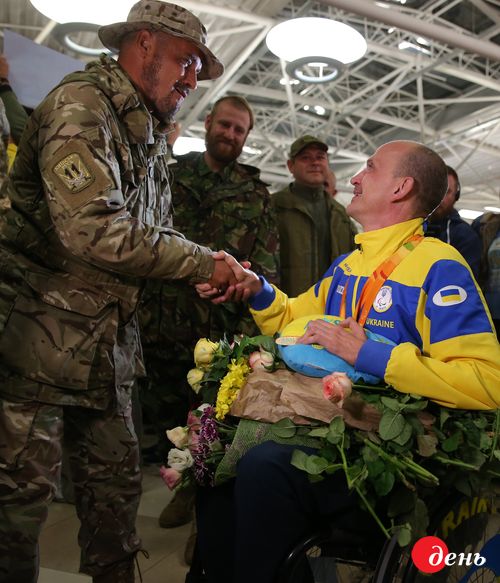
“My sincere gratitude to all Ukrainians who believed in us, and also to the state: the Ministry of Sport, the Ministry of Social Policy, the Ministry of Finance, the president, everyone who enabled our performance and our victory in Rio,” said head of the National Paralympic Committee of Ukraine Valerii Sushkevych who returned from Rio together with the team. “I would like to ask our government to make sure that the disabled get a decent level of social support. These people can do incredible things, they can score victories in honor of Ukraine. And we dedicate our victory in Rio to the ATO warriors, the heroes defending our country’s independence.”
The closing speech was made by Taras Dutko, 2016 Paralympic champion and member of Ukraine’s national 7-a-side soccer team. “On behalf of the athletes I address our country’s leaders: I ask you to see and hear our coach, Valerii Sushkevych. Hear him in the context of our victory, because here, in Ukraine, there still are great numbers of people who need immediate and urgent support. This includes therapy, prosthetics, and urgent aid. This is what ATO troops need who came home in an utterly grave condition,” said Dutko.

After a half-hour-long formal meet-and-greet event the security fences were removed, and some hundred people rushed to congratulate the athletes, along with three dozens of journalists accredited for the event.
“The way back took us more than 24 hours. It was excruciating, and of course, everyone is simply exhausted. But as soon as we walked into the arrivals hall, the fatigue disappeared without trace: we didn’t even expect such huge support and gratitude from Ukrainians. We thank everyone for their warmth and faith in us,” said Maksym Veraksa, owner of one gold and two bronze medals for swimming in the Paralympic Games 2016. His chest was decorated with three medals, and he held an impressive bunch of flowers in his arms. While we talk, flowers are being presented to Veraksa, fans are coming to take a picture together, or get something signed. “I feel like a true star,” smiles the athlete. “The gold medal proved the hardest. It was the longest-awaited, and when it comes to weight, you know, it is pretty heavy. Frankly, it is a bit hard, but I feel honored to wear such awards around my neck. For all of us, a new Olympic cycle is starting tomorrow, which means nothing but training, training, and once again, training. As for me, I am a mature sportsman, I have represented Ukraine many times [Maksym Veraksa has been eight times Paralympic champion in 2008, 2012, and 2016, and four times bronze prize winner in 2008, 2012, and 2016. – Ed.]. But if I am strong enough, and if the coaches keep believing in me, I am ready to compete for the national team in the future as well.”
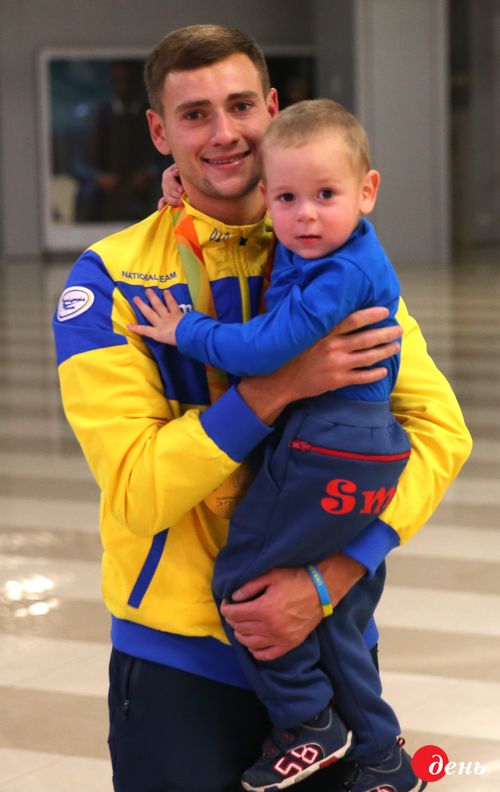
“The minister said right words about supporting the Paralympic movement,” went on Veraksa. “But as a matter of fact, people with a handicap have pretty many problems not only in sport, but in everyday life as well. The problems which for some reason go unnoticed by both ordinary citizens and the state. We Paralympic athletes have for an umpteenth time proved that people with limited physical abilities can show impressive results. And not only in sports, by the by. We have proven that we are not ‘on the fringes of society,’ as we, unfortunately, are sometimes called. You know, in two previous Paralympic Games Ukraine’s national team came fourth in total medal count. Now we have come home with the third place. It is a phenomenal, historical result! I believe it can trigger some positive changes in Ukrainian society; it can push people towards revising their views on the disabled. Every person wants to live, work, and realize themselves. We show that we can be useful. Yes, we have limited abilities, but we are as human as anyone else, and we deserve to be loved, respected, and supported.”
“I would very much like (it is my dream, actually) that such historical results, such a success enabled government to remember the disabled people somewhat more often than once in four years. And not only athletes deserve to be remembered,” adds Yelyzaveta Mereshko, winner of one bronze and four gold medals in Rio. “First of all, this is a challenge for government, which should have at least showed an example to society. We are Ukrainians who love their country and do their best to promote it, and the only thing we ask for in return is equal living standards. I was just asked by a journalist about the secret recipe for achieving such results. Dear friends, there are no secrets there. It takes work: a load of it. Personally I never dreamed of winning five medals. I expected to win at least one. But when you persistently get ready for each start, you realize that you can do more. Thank you for the fantastic, warm welcome, the sea of flowers and all the nice words. Let us love and develop our country together.”
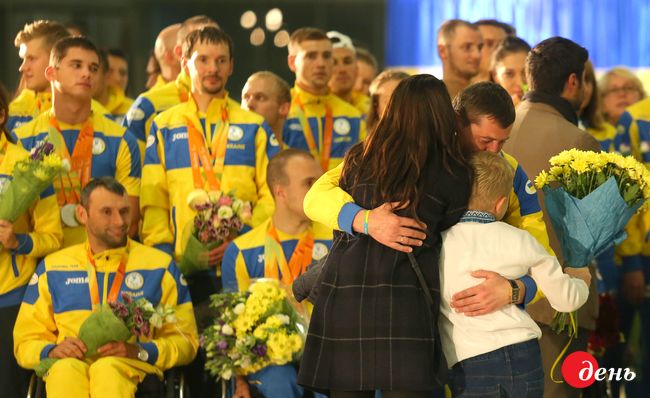
Hardly had Mereshko finished speaking with me when a woman with flowers came up, bent down near her wheelchair, hugged and kissed her. “Are you the mom?” asked I. “No, just a fan,” answers Maryna Sytnyk from Kyiv. “I have come here to express my sincere gratitude to them. These people’s willpower and patriotism are simply astonishing. I tried to see as many broadcasts as possible, and I was a fierce supporter. Of course, when I got to know the arrival time, I could not but come here, even on a rainy night. Physically able people often break down and collapse in hard circumstances, they say that their life is over, there is no more prospect. But I cried each day I watched our heroes on the TV screen. People with physical limitations demonstrate a limitless power of spirit. All of them are beautiful, optimistic, self-confident. And also, they are always set to win.”
At the exit from the terminal we come across Denys Dubrov, the pride of Ukrainian swimming sport. He is very tired. He says that after the contests and flight his only dream is to have a decent night’s sleep and a couple of days to rest. “For me, winning the first medal was very hard. However, I started with winning the silver, which inspired me to try harder and boosted my self-confidence. I thought: if I proved that I can win silver, why shouldn’t I try better and win gold for myself and my country? So I won three gold medals! (Smiling.) And towards the end of the games I just kept the same tempo, going on the same level which I simply could not bring down,” says Denys Dubrov, winner of three gold, three silver, and two bronze medals at the Paralympic Games in Rio. “You know, journalists and officials have been calling us here heroes. The true heroes are the ATO soldiers. They are the people who in fact preserve our country. We only help promote it a little. I believe that when Ukraine has peace, there will be more medals.”
P.S. We remind our readers that The Day has started a series of articles about Paralympic champions of Rio 2016.

